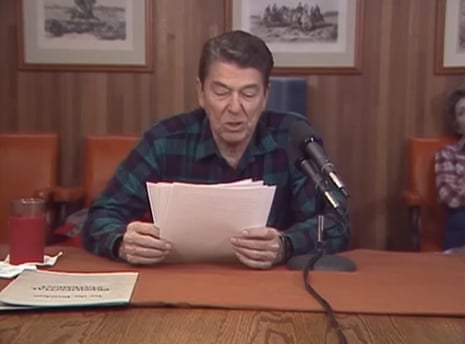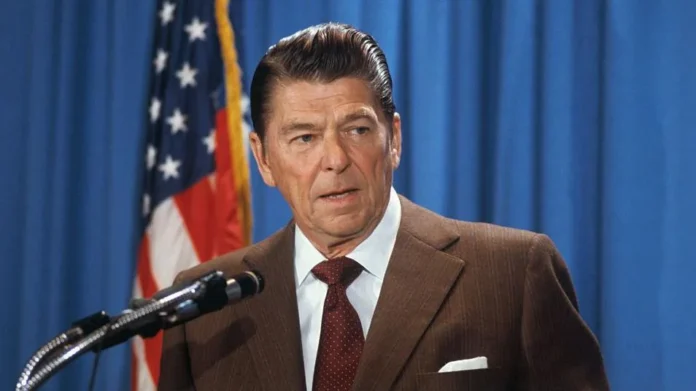Trump Halts Negotiations After Controversial Reagan Clip
A new advertisement featuring former US President Ronald Reagan’s 1987 address on free trade has triggered a major diplomatic rift between the United States and Canada, prompting President Donald Trump to suspend all ongoing trade negotiations with Ottawa.
The one-minute ad, released by the Province of Ontario, uses excerpts from Reagan’s “Address to the Nation on Free and Fair Trade”, where he warned about the dangers of protectionism and high tariffs.
President Trump called the advert “fake and misleading,” while the Ronald Reagan Presidential Foundation said the message “misrepresents Reagan’s original speech.”
The Reagan Speech Behind the Controversy

In the 1987 radio address, Reagan discussed US trade relations—particularly with Japan—and defended free trade as vital for economic prosperity.
At that time, the US had imposed limited tariffs on Japanese imports after a trade dispute, but Reagan used the opportunity to warn against long-term protectionism, saying it could lead to economic decline and job losses.
The Ontario-sponsored ad revives segments of that historic speech, editing together direct quotes from Reagan. While it does not alter his words, it rearranges their order and context, presenting a stronger anti-tariff message than the original delivery.
The advert begins with Reagan’s statement:
“When someone says, ‘let’s impose tariffs on foreign imports,’ it looks like they’re doing the patriotic thing by protecting American products and jobs. And sometimes, for a short while it works, but only for a short time.”
Although Reagan did say this in his 1987 address, the line actually appears midway through the original speech, not at the beginning.
How the Ad Changes Reagan’s Message

The controversy stems from the editing sequence rather than the content itself.
For instance, the advert follows Reagan’s first line with:
“Over the long run, such trade barriers hurt every American, worker and consumer.”
In reality, Reagan said this earlier in his original address while explaining his reluctance to impose tariffs on Japan. Between these two sentences in the actual speech, Reagan discussed how some companies had violated trade agreements, calling Japan’s case a “special circumstance.”
The advert’s next line—“High tariffs inevitably lead to retaliation by foreign countries and the triggering of fierce trade wars”—also appears in the original address, but again is taken out of sequence. Reagan originally said this while warning that protectionism invites foreign retaliation, damaging global markets.
In its edited form, the advert combines these remarks into a single, continuous message against tariffs, giving the impression that Reagan was speaking directly about modern US policy, rather than historical trade concerns.
Trump Accuses Ontario of “Political Interference”
Reacting to the advert, President Trump accused Canadian officials of political interference in US domestic policy.
He announced via social media that all trade talks with Canada were “terminated immediately”, citing the ad’s “distortion” of Reagan’s views to undermine his own tariff policies.
“Reagan believed in strong American trade and fair deals—not fake propaganda from Canada,” Trump said.
He also criticised the Reagan Foundation for “failing to protect his legacy from manipulation.”
Ontario’s government, however, defended the ad, saying it was intended to highlight the long-term risks of tariffs and promote open trade between North American partners. A spokesperson said the ad used “authentic, unaltered words” from the late president and aimed to remind leaders that “free trade benefits everyone.”
Reagan Foundation Clarifies Position
The Ronald Reagan Presidential Foundation and Institute issued a statement clarifying that while the advert used Reagan’s actual words, it “reordered them in a misleading way.”
It stressed that the former president’s speech in 1987 was directed at a specific trade dispute and not at any modern US administration.
“President Reagan believed in fair and reciprocal trade,” the Foundation said, noting that while he opposed broad tariffs, he also defended American interests when foreign partners violated agreements.
Analysts Warn of Trade Fallout
Economic analysts fear that Trump’s decision could stall ongoing North American trade progress, particularly talks aimed at strengthening USMCA (United States-Mexico-Canada Agreement) provisions.
Experts say the dispute underscores how historical figures are increasingly being used as political tools in current economic debates.
Trade policy researcher Maia Davies said, “The issue isn’t what Reagan said—it’s how his message was repurposed. The fallout shows how sensitive US-Canada relations remain when trade nationalism resurfaces.”
Calls for Calm and Diplomacy
Diplomatic officials from both sides have urged restraint.
Canada’s Foreign Ministry expressed “regret” over the misunderstanding and called for the resumption of talks through diplomatic channels.
Washington, however, has yet to issue a formal response about restarting negotiations.
Observers note that this latest clash highlights the fragile nature of North American trade relations amid ongoing debates over tariffs, manufacturing jobs, and protectionist policies.
As tensions grow, Reagan’s decades-old warning seems more relevant than ever: “High tariffs inevitably lead to retaliation, trade wars, and lost prosperity.”

